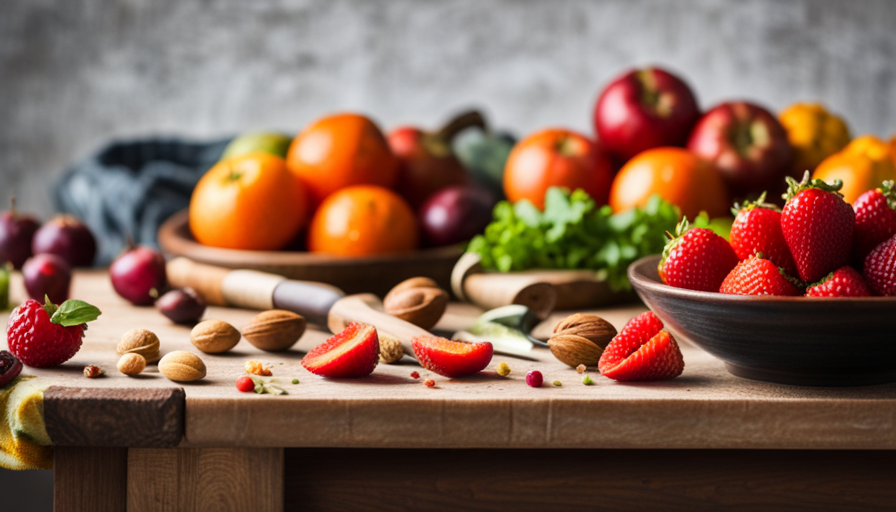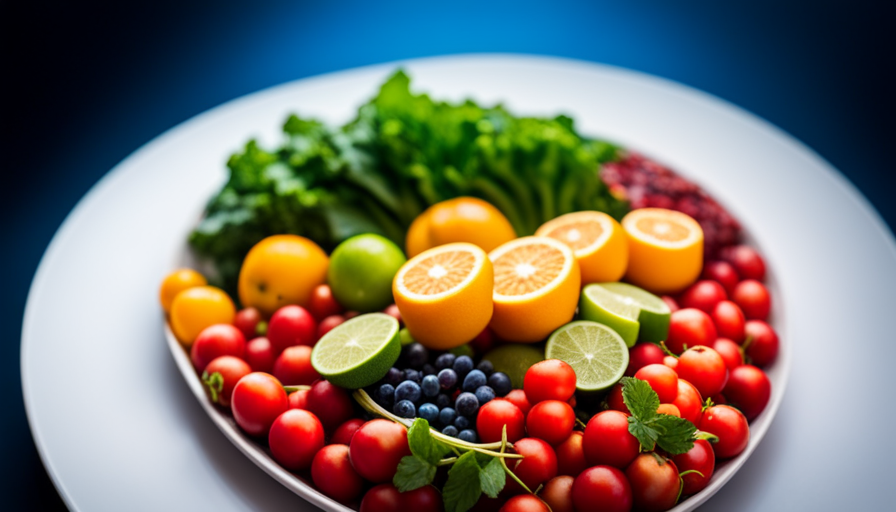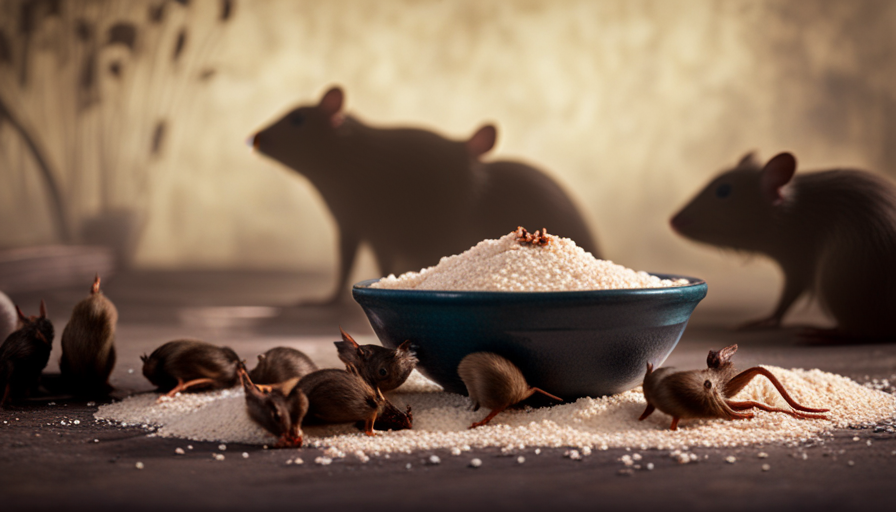Were you aware that 70% of chronic illnesses can be avoided with appropriate nutrition? As a registered dietitian, I am always researching various dietary methods to assist people in enhancing their overall health and wellness.
One popular diet that has gained attention in recent years is the raw food diet. But is it really as healthy as it claims to be? In this article, I will present evidence-based information on the raw food diet, providing a balanced perspective on its potential benefits and drawbacks.
While raw food enthusiasts argue that this diet can provide an abundance of nutrients and enzymes, it is important to address potential nutritional deficiencies and health risks that may arise.
I will also offer practical advice on implementing a raw food diet, including tips on meal planning, food safety, and overcoming potential challenges.
So, let’s dive into the world of raw food and determine if it truly lives up to its health claims.
Key Takeaways
- The raw food diet can lead to improved digestion, increased energy levels, weight loss, and reduced risk of chronic diseases, but it may also result in nutrient deficiencies if not carefully planned.
- Gradual transition and incorporation of more whole foods are important when adopting a raw food diet.
- Fruits, vegetables, nuts, seeds, and legumes should make up a significant portion of the diet to ensure essential vitamins, minerals, and antioxidants are consumed.
- Consultation with a registered dietitian or nutritionist is crucial to develop a meal plan that meets specific requirements and address potential nutrient deficiencies.
What is the Raw Food Diet?
Are you curious about the Raw Food Diet and how it can benefit your health? As a registered dietitian, I aim to provide accurate and trustworthy information based on scientific research and reliable sources.
The Raw Food Diet emphasizes the consumption of unprocessed and uncooked plant-based foods, such as fruits, vegetables, nuts, and seeds. Proponents of this diet believe that cooking can destroy essential nutrients and enzymes in food, leading to potential health benefits like improved digestion and increased energy levels.
While raw food diet recipes can be creative and diverse, it is important to consider the potential drawbacks. Cooking certain foods can actually increase the bioavailability of nutrients, such as lycopene in tomatoes. Additionally, relying solely on raw foods may result in nutritional deficiencies, particularly in vitamin B12, iron, and calcium. It is crucial to ensure a well-rounded diet that meets all nutrient needs.
If you are interested in trying the Raw Food Diet, it is important to plan your meals carefully to ensure you are getting all the necessary nutrients. Incorporating a variety of fruits, vegetables, nuts, and seeds into your diet is essential. It is also important to practice good food safety, such as washing produce thoroughly and storing food properly. Potential challenges of this diet include the time and effort required for meal preparation and the need for extensive meal planning.
Transitioning into the next section, let’s explore the potential benefits of a raw food diet and how it can positively impact your health.
The Potential Benefits of a Raw Food Diet
You won’t believe the incredible perks you’ll experience when you jump on the bandwagon of this trendy, uncooked cuisine! A raw food diet boasts numerous potential benefits that can positively impact your health and well-being. By consuming raw fruits, vegetables, nuts, and seeds, you’ll be loading up on essential nutrients that support overall health.
To give you an idea of the nutritional benefits, take a look at the table below:
| Nutrient | Benefits | Food Sources |
|---|---|---|
| Vitamin C | Boosts immune system | Citrus fruits |
| Fiber | Promotes healthy digestion | Leafy greens |
| Healthy fats | Supports brain function | Avocado |
| Antioxidants | Reduces risk of chronic diseases | Berries |
| Enzymes | Enhances digestion | Raw honey |
These are just a few examples of the potential benefits you can obtain from a raw food diet. Additionally, adhering to this diet in the long term may lead to improved digestion, increased energy levels, weight loss, and a reduced risk of chronic diseases.
As a registered dietitian, it’s important to provide a balanced perspective. While the raw food diet offers many benefits, it’s crucial to address potential drawbacks and risks. In the next section, we’ll explore the potential drawbacks of a raw food diet and how to navigate them.
Potential Drawbacks of a Raw Food Diet
Get ready to hear about some potential downsides of going all in on the trendy raw food lifestyle! While a raw food diet can offer numerous health benefits, it’s important to consider the potential drawbacks as well.
One concern is the effect of a raw food diet on digestion. Raw foods, especially vegetables and fruits, are high in fiber, which can be difficult for some individuals to digest. This can lead to bloating, gas, and discomfort.
Additionally, cooking certain foods can actually enhance their nutrient availability. For example, cooking tomatoes increases the bioavailability of lycopene, a powerful antioxidant. Therefore, a raw food diet may result in possible nutrient deficiencies if not carefully planned. Certain nutrients, such as vitamin B12, iron, and omega-3 fatty acids, are more easily obtained from animal products or cooked foods. It’s important to ensure adequate intake of these nutrients while following a raw food diet.
Next, I will provide practical advice on how to transition to a raw food diet, taking into account these potential drawbacks and ensuring a balanced approach to health and wellness.
How to Transition to a Raw Food Diet
When considering transitioning to a raw food diet, it’s important to take a gradual approach to allow your body to adjust to the change.
Start by incorporating more whole foods into your meals, such as fruits, vegetables, nuts, and seeds.
Trying new recipes and techniques can also help keep your meals interesting and enjoyable.
As a registered dietitian, I’d provide practical advice on meal planning, food safety, and potential challenges to ensure a smooth transition to a raw food diet.
Gradual Transition
As you ease into the raw food diet, your body will gradually adjust to the increased intake of fresh fruits and vegetables, resulting in improved digestion and overall well-being. Transitioning gradually allows your body to adapt to the changes and ensures a smoother adjustment.
By starting with small changes, such as replacing one cooked meal with a raw meal or adding more raw fruits and vegetables to your current diet, you can gradually increase your raw food intake. This approach not only helps your body adjust to the new diet, but it also allows you to experiment with different recipes and find what works best for you.
Incorporating more whole foods into your diet is an important aspect of the raw food lifestyle, as it provides essential nutrients and promotes optimal health.
Incorporating More Whole Foods
By gradually adding a variety of vibrant and nutrient-rich fruits, vegetables, and grains to your meals, you can create a colorful and satisfying plate that nourishes your body from the inside out. Incorporating more whole foods into your raw food diet not only increases the variety of nutrients you consume but also adds flavor and texture to your meals.
Whole foods like berries, leafy greens, and quinoa provide essential vitamins, minerals, and fiber that support overall health. Simplifying meal preparation can be achieved by focusing on simple recipes that require minimal cooking or processing. This not only saves time but also ensures that you retain the maximum nutritional value of the foods you consume.
Trying new recipes and techniques can further enhance your raw food journey, allowing you to explore different flavors and expand your culinary skills.
Trying New Recipes and Techniques
Experimenting with new recipes and techniques can introduce a world of exciting flavors and culinary possibilities to your journey towards vibrant nourishment. When following a raw food diet, trying new ingredients and exploring different cooking methods can help keep your meals interesting and satisfying.
Incorporating a variety of fruits, vegetables, nuts, and seeds into your recipes can provide a wide range of nutrients and flavors. For example, you can experiment with making raw vegetable noodles using a spiralizer or try making raw desserts using dates and nuts as a base.
However, it’s important to ensure that you’re still meeting your nutritional needs while on a raw food diet. In the next section, we’ll discuss some tips for maintaining a balanced raw food diet.
Tips for a Balanced Raw Food Diet
Try incorporating a variety of fruits, vegetables, nuts, and seeds into your raw food diet to ensure a balanced and nutrient-rich eating plan. Gradually transitioning to a raw food diet can be achieved by incorporating more whole foods into your meals.
Fruits and vegetables should make up a significant portion of your diet, as they provide essential vitamins, minerals, and antioxidants. Nuts and seeds are excellent sources of healthy fats and protein.
It’s important to ensure you’re consuming enough calories and nutrients to meet your body’s needs, so it may be helpful to consult with a registered dietitian or nutritionist to develop a meal plan that meets your specific requirements.
Additionally, it’s crucial to practice proper food safety when consuming raw foods to minimize the risk of foodborne illnesses.
While a raw food diet can offer many health benefits, it’s important to address the potential drawbacks and nutritional deficiencies associated with this eating plan.
Stay tuned for common misconceptions about the raw food diet, and how to navigate them effectively.
Common Misconceptions about the Raw Food Diet
One misconception about the raw food lifestyle is that it lacks variety, but did you know that there are over 20,000 edible plant species in the world? The raw food diet actually offers a wide range of options when it comes to creating delicious and nutritious meals. From fruits and vegetables to nuts, seeds, and sprouts, there are countless ways to combine these ingredients to create flavorful dishes.
Additionally, the raw food diet encourages creativity in the kitchen, as it often involves experimenting with different textures and flavors.
When it comes to digestion, another common misconception is that raw food is harder to digest compared to cooked food. However, scientific research suggests that the enzymes present in raw food can actually aid in digestion. These enzymes help break down the food, making it easier for our bodies to absorb the nutrients. Additionally, raw food is generally high in fiber, which promotes healthy digestion and can help prevent constipation.
Transitioning into the next section about potential risks and precautions, it is important to note that while the raw food diet offers many potential health benefits, there are also some considerations to keep in mind.
Potential Risks and Precautions
While enjoying the wide array of options the raw food lifestyle offers, it’s important to be aware of potential risks and precautions that should be taken into consideration.
When following a raw food diet, there is a risk of nutrient deficiencies due to the limited variety of foods consumed. Some nutrients, such as vitamin B12 and iron, are primarily found in animal products, which are excluded from a raw food diet. This can lead to deficiencies and potential health problems if not properly addressed through supplementation or careful food selection.
Additionally, food safety concerns should be taken seriously when consuming raw foods. Raw fruits and vegetables can be contaminated with harmful bacteria, such as E. coli and Salmonella, which can cause foodborne illnesses. Thoroughly washing produce and practicing good food hygiene, such as avoiding cross-contamination, can help reduce the risk of illness.
To ensure a balanced perspective, it is important to acknowledge that while the raw food diet can offer health benefits, it may not be suitable for everyone. Individuals with certain medical conditions, such as weakened immune systems or digestive disorders, should consult with a healthcare professional before starting a raw food diet.
In the next section, we will explore the relationship between the raw food diet and weight loss, examining whether this lifestyle choice is effective for achieving and maintaining a healthy weight.
Raw Food Diet and Weight Loss
When considering the raw food diet for weight loss, there are several key points to keep in mind. First, caloric restriction is often a factor in weight loss on this diet. Many raw foods are lower in calories compared to their cooked counterparts. However, it’s important to maintain balanced nutrition to ensure adequate intake of essential nutrients.
Additionally, combining raw foods with regular exercise can enhance weight loss efforts and overall health.
Caloric Restriction
By following a raw food diet, individuals may imagine themselves feeling satisfied with smaller portions due to the natural caloric restriction. This is because raw foods are generally lower in calories compared to cooked and processed foods.
However, it’s important to note that caloric intake needs to be carefully monitored to ensure adequate nutrition. While a raw food diet can provide an abundance of vitamins, minerals, and antioxidants, there’s a potential for nutrient deficiency if not properly planned. For example, certain nutrients like vitamin B12, iron, and omega-3 fatty acids are primarily found in animal-based foods, which aren’t typically consumed on a raw food diet.
Therefore, it’s crucial to consult with a healthcare professional or registered dietitian to ensure that the diet is nutritionally balanced and to address any potential deficiencies. Moving forward, it’s important to understand the importance of balanced nutrition in a raw food diet.
Importance of Balanced Nutrition
Achieving optimal nourishment is like building a strong foundation for your body’s well-being. When it comes to the raw food diet, balanced nutrition is key. While raw food enthusiasts may argue that this diet provides all the necessary nutrients, it is important to approach it with a critical eye.
A registered dietitian or nutritionist would present both the potential benefits and drawbacks of the raw food diet, ensuring a balanced perspective. They would highlight the nutrients that can be obtained from raw food but also address any potential nutritional deficiencies or health risks associated with the diet.
To maintain balanced nutrition on a raw food diet, it is crucial to include a variety of fruits, vegetables, nuts, seeds, and legumes. It is also important to consider supplementation for certain vitamins and minerals that may be lacking. By prioritizing healthy eating and a well-rounded approach to the raw food diet, individuals can optimize their overall health and well-being.
Transitioning into the subsequent section about combining raw foods with exercise, it is important to consider the impact of physical activity on a raw food lifestyle.
Combining Raw Foods with Exercise
Optimizing your fitness and well-being is as simple as incorporating raw, nutritious foods into your exercise routine. The raw food diet, when done correctly, can provide numerous benefits for your workouts.
Raw foods are rich in natural enzymes, which can aid in digestion and nutrient absorption, leading to increased energy levels and improved athletic performance. Additionally, raw fruits and vegetables are packed with antioxidants, vitamins, and minerals that support muscle recovery and overall health.
However, it’s important to approach the raw food diet with caution. While it can be nutrient-dense, it may also be low in certain essential nutrients like protein, calcium, and vitamin B12. These deficiencies can impact muscle growth, bone health, and energy production. It’s crucial to ensure you’re getting a well-rounded intake of nutrients through careful meal planning and possibly supplementation.
To incorporate raw foods into your exercise routine, focus on consuming a variety of fruits, vegetables, nuts, and seeds. Experiment with different combinations to find what works best for you. It’s also important to pay attention to food safety and hygiene when consuming raw foods to avoid potential foodborne illnesses.
Incorporating raw foods into your exercise routine can have numerous benefits for your overall health and fitness. However, it’s important to consult with a registered dietitian or nutritionist to ensure that the raw food diet is suitable for your specific needs and goals. They can provide personalized advice on meal planning, food safety, and potential challenges that may arise. By combining raw foods with exercise, you can take a holistic approach to your health and well-being.
Transition: Moving forward, let’s explore expert opinions and research findings on the raw food diet to gain a deeper understanding of its potential impact on our health.
Expert Opinions and Research Findings
When it comes to the topic of raw food diets and weight loss, it’s important to consider expert opinions and research findings.
Studies on raw food diets have shown potential benefits, such as increased intake of certain nutrients and weight loss. However, it’s crucial to balance these findings with the individualization of the diet and consulting with a healthcare professional to ensure it’s healthy and suitable for you.
As a registered dietitian, I’d provide evidence-based information on the raw food diet, presenting both its potential benefits and drawbacks. I’d also offer practical advice, including tips on meal planning, food safety, and addressing challenges that may arise while following the diet.
Studies on Raw Food Diets
There have been numerous studies conducted on raw food diets, revealing their potential health benefits. Research has shown that individuals who follow a raw food diet may experience improved digestion, increased energy levels, and weight loss.
Additionally, studies have found that a raw food diet can be rich in essential nutrients such as fiber, antioxidants, and phytochemicals, which are beneficial for overall health and may reduce the risk of chronic diseases. However, it’s important to note that long-term effects of a raw food diet are still not well understood, and there may be potential nutritional deficiencies and health risks associated with this type of diet.
Therefore, it’s crucial to approach a raw food diet with caution and consult a healthcare professional or registered dietitian before making any significant dietary changes. Transitioning into the subsequent section, a balanced perspective is necessary to fully evaluate the raw food diet and its suitability for individual needs.
Balance and Individualization
To fully evaluate the suitability of a raw food diet for your individual needs, it is crucial for you to approach it with a balanced perspective and consult a healthcare professional or registered dietitian before making any significant dietary changes. When considering a raw food diet, balance is key. While raw food can provide important nutrients, it’s important to be aware of potential deficiencies or health risks associated with the diet. Maintaining a personalized approach to a raw food diet is essential to ensure you are meeting your individual nutritional needs. It’s important to consider factors such as age, activity level, and any underlying health conditions when determining if a raw food diet is right for you. Consulting a healthcare professional or registered dietitian can provide valuable guidance and support in navigating the potential challenges and ensuring a safe and healthy transition to a raw food diet.
Consulting with a Healthcare Professional
Seek specialized support and guidance from a healthcare professional to ensure a safe and sound transition to a nourishing natural nutrition plan. Consulting with a healthcare professional is essential when considering the raw food diet as a lifestyle choice.
A registered dietitian or nutritionist can provide valuable healthcare advice and offer a professional opinion tailored to your specific needs and health goals. They can help you understand the potential benefits and drawbacks of the raw food diet and address any concerns you may have regarding nutritional deficiencies or health risks.
Moreover, they can provide practical advice on implementing a raw food diet, including tips on meal planning, food safety, and overcoming potential challenges. By seeking the expertise of a healthcare professional, you can make an informed decision about whether the raw food diet is right for you.
Making an Informed Decision
Imagine having all the information you need to make an informed decision about the raw food diet and its potential benefits for your health. As a registered dietitian, I strive to provide accurate and trustworthy information based on scientific research and reliable sources.
When it comes to the raw food diet, it is important to present a balanced perspective. While raw foods can provide essential nutrients, it is crucial to address any potential nutritional deficiencies or health risks associated with the diet.
One of the key considerations when transitioning to a raw food diet is the method used. Gradual transitioning is often recommended to allow the body to adapt slowly. This can involve increasing the amount of raw foods in your diet over time, while still incorporating cooked foods. This approach can help ensure long-term sustainability and prevent any drastic changes that may be challenging to maintain.
Additionally, it is important to consider the practical aspects of implementing a raw food diet. Meal planning becomes essential to ensure a variety of nutrient-dense foods are included. It is also crucial to prioritize food safety, as raw foods can pose a higher risk of foodborne illnesses. Proper washing and handling techniques should be followed to minimize any potential risks.
While the raw food diet can offer potential benefits, it may not be suitable for everyone. Consulting with a healthcare professional, such as a registered dietitian or nutritionist, can provide personalized guidance and support. They can assess your individual needs and provide practical advice tailored to your specific situation.
Making an informed decision about the raw food diet involves understanding the potential benefits and drawbacks. By considering transitioning methods and long-term sustainability, along with seeking guidance from a healthcare professional, you can ensure that your decision is well-informed and aligned with your health goals.
Frequently Asked Questions
Can I still get enough protein on a raw food diet?
Yes, it’s possible to get enough protein on a raw food diet. Protein sources such as nuts, seeds, sprouts, and certain fruits and vegetables can provide the necessary protein. Raw food recipes can be designed to include a variety of protein-rich ingredients.
While a raw food diet can offer benefits like increased nutrient intake and weight loss, it’s important to note that it may also present challenges in meeting all nutritional needs. Consulting a registered dietitian can provide practical advice and guidance on implementing a balanced raw food diet.
Is it safe to consume raw animal products on a raw food diet?
Incorporating raw animal products into a raw food diet raises concerns about the safety of consuming these products. There are potential health risks associated with consuming raw animal products, such as the risk of foodborne illnesses caused by bacteria or parasites.
It’s important to handle and store these products properly to minimize the risk of contamination. Additionally, it’s crucial to ensure a balanced intake of nutrients and address any potential nutritional deficiencies that may arise from excluding certain food groups.
Are there any specific precautions I should take when following a raw food diet?
When following a raw food diet, it’s important to take certain precautions to ensure your health and safety. While there are potential benefits, such as increased nutrient intake, it’s crucial to be aware of the potential health risks. These include bacterial contamination from raw animal products and potential nutritional deficiencies. To mitigate these risks, it’s important to practice proper food safety measures, such as thorough washing and handling of produce. It’s also a good idea to consult with a registered dietitian to ensure you’re meeting your nutritional needs.
How can I maintain a balanced diet while following a raw food diet?
To maintain a balanced diet while following a raw food diet, it’s important to focus on maintaining energy levels and understanding the potential health benefits. By incorporating a variety of fruits, vegetables, nuts, and seeds, you can obtain essential nutrients like vitamins, minerals, and antioxidants.
However, it’s crucial to be aware of potential nutritional deficiencies and health risks associated with this diet. To ensure success, consult a registered dietitian or nutritionist for practical advice on meal planning, food safety, and overcoming challenges.
Can a raw food diet lead to nutrient deficiencies?
A raw food diet has the potential risks of nutrient deficiencies and long-term effects. While raw foods can provide important nutrients, such as vitamins and minerals, it’s important to address the potential nutritional deficiencies and health risks associated with this diet.
To mitigate these risks, it is important to carefully plan meals, ensure food safety, and address any challenges that may arise. It is crucial to consult with a registered dietitian or nutritionist before implementing a raw food diet to ensure it’s healthy and suitable for an individual.
What Are the Health Benefits of the Raw Food Diet?
The raw food diet benefits include improved digestion, better nutrient absorption, and higher energy levels. This diet is rich in enzymes, vitamins, and minerals, which can lead to a stronger immune system and reduced inflammation. Additionally, it can aid in weight loss and support overall health and well-being.
Conclusion
In conclusion, after examining the potential benefits and drawbacks of the raw food diet, it’s clear that there are both positive and negative aspects to consider.
While a raw food diet can provide an abundance of nutrients and promote weight loss, it’s important to be aware of potential nutritional deficiencies and health risks associated with this eating approach.
However, with proper planning and guidance from a registered dietitian or nutritionist, it’s possible to implement a balanced and healthy raw food diet.
It’s always recommended to consult a healthcare professional before making any significant changes to your diet.










